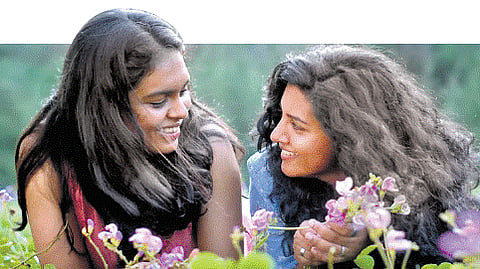

The familiar whir of a motorcycle engine, wind whipping through the hair, shared smiles between two people—these images often flood the cinematic landscape of romance. Director Jayaprakash Radhakrishnan, however, takes this well-worn trope and infuses it with a fresh perspective in Kaadhal Enbadhu Podhu Udamai (KEPU).
“I intentionally chose the cliched trope of a bike ride to depict the two female leads falling in love,” he says. “I wanted a love song that felt like it belonged in any commercial film. While I could have approached this project with a film festival-driven perspective, my goal was to make a film for everyone.
With the ‘Theeyai’ song, I wanted to create the first love song between two women to mirror the conventional portrayal of heterosexual love. I didn’t draw inspiration from other films—rather, I imagined how I would personally experience love. After all, anyone would want to take their loved one on a bike ride.”
This desire to connect with a wider audience extends to the film’s approach to queer representation. The conversation around casting queer actors in queer roles is one that Radhakrishnan acknowledges with sincerity. “The queer community’s request for authentic representation in queer roles is completely understandable,” he shares.
“The intention was never to exclude them. However, the number of actors from the community remains scarce—not by their fault, but due to the industry’s limitations.” He sees KEPU as a step toward shifting those limitations. “I hope the film encourages more queer actors to step into the industry. Moreover, having an established star like Nayanthara or Trisha in the role could have elevated the film’s reach.
After all, Mammootty sir took on such a role at this stage in his career.” For actor Kalesh Ramanand, who plays Ravindra, the role proved transformative and opened him up to the nuances of allyship. “My character was more revelatory than relatable for me. It made me aware of my internal biases. Many of us believe we are allies to the queer community, but in reality, we often stop at acknowledgement rather than true acceptance.
Most of us don’t have a queer person in our close friend circle or family, which suggests a subconscious distancing. Acceptance is crucial, and Ravindra embodies that. In real life, if a man falls in love with a woman and later learns she is queer, he is more likely to distance himself. But Ravindra does the opposite—he becomes her closest friend and even convinces her parents to accept her,” says Kalesh.
As revealed by the actor, the film explores acceptance, through Sam’s (Lijomol Jose) journey of coming out to her parents, rather than just the romance between Sam and Nandhini (Anoosha). Radhakrishnan says. “KEPU is not just about Sam and Nandhini—the true protagonist is Rohini’s Lakshmi.
Even if I had removed the romantic portions, the film would have still worked. I chose to take that cinematic liberty to make the film more commercially appealing.” One of the most poignant moments in the film is its final shot—an understated yet powerful act of love from mother to daughter.
“The final shot, where Lakshmi returns Sam’s Barbie doll, marks the beginning of her journey toward acceptance,” Radhakrishnan explains. “While she may not fully understand her daughter yet, it signifies her effort to try. Through this scene, I wanted to convey that Lakshmi will no longer dismiss Sam’s sexual identity as just a ‘phase.’ Instead, she will take steps to understand her daughter,” he concludes.